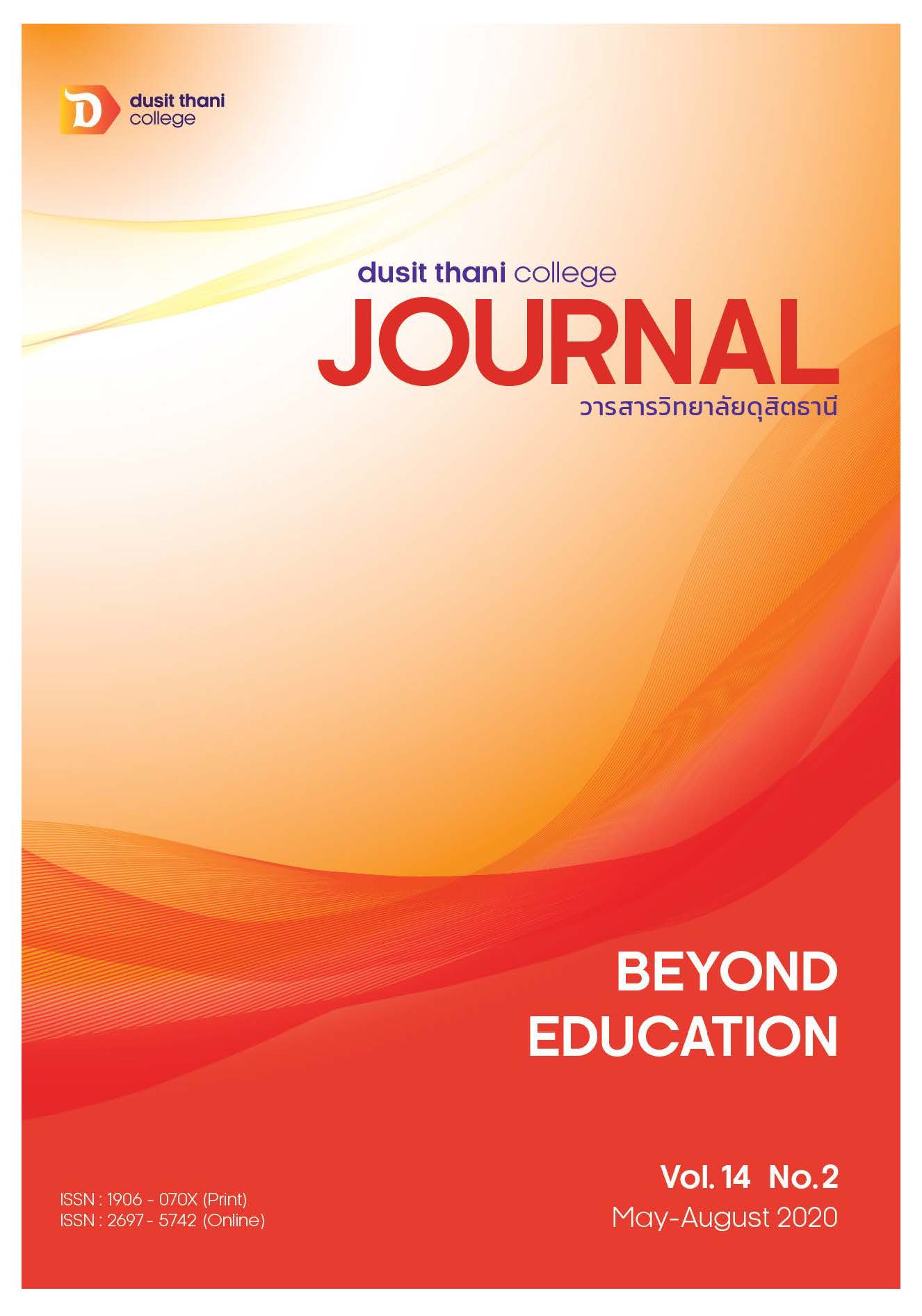การวัดผลของการเรียนรู้เชิงบูรณาการ : กรณีของนักศึกษาสาขาการจัดการโรงแรม และรีสอร์ท (นานาชาติ) วิทยาลัยดุสิตธานี
Main Article Content
บทคัดย่อ
ในการศึกษาครั้งนี้มีวัตถุประสงค์เพื่อประเมินการจัดการการเรียนการสอนที่บูรณาการกับการทำงานของหลักสูตรการจัดการโรงแรมและรีสอร์ท (นานาชาติ) จากนักศึกษาวิทยาลัยดุสิตธานีเพื่อพัฒนาและเป็นแนวทางในการจัดการการเรียนการสอนที่บูรณาการกับการทำงานของนักศึกษาวิทยาลัยดุสิตธานี
หลักสูตรการบริการเป็นหลักสูตรที่อุตสาหกรรมมีความต้องการนักศึกษาในการสร้างเสริมประสบการณ์ในขณะที่กำลังศึกษาอยู่ในหลักสูตรภายใต้สถาบันการศึกษาและได้รับมุมมองของมืออาชีพในอุตสาหกรรมดังกล่าว ดังนั้น หลักสูตรการจัดการโรงแรมและรีสอร์ท (นานาชาติ) จึงใช้วิชาการแผนกงานส่วนหน้าและแม่บ้านเป็นวิชาที่ใช้ในการฝึกที่โรงแรมดุสิต ปริ้นเซส ศรีนครินทร์ กรุงเทพ
การศึกษาในครั้งนี้ใช้การสัมภาษณ์แบบเชิงลึกโดยการใช้โครงสร้างแบบกึ่งโครงสร้างตามแนวคิดของ Smith (2012) อันได้แก่ ความถูกต้อง จัดตำแหน่ง การสนับสนุนการเรียนรู้แบบบูรณาการ การเข้าถึงหัวหน้างานและการชี้นำ และกระบวนการเตรียมการข้อมูลในการศึกษาครั้งนี้ถูกวิเคราะห์จากการวิเคราะห์เชิงเนื้อหา และผลการศึกษาที่ได้รับจากการศึกษาครั้งนี้ คือ การพัฒนาแนวทางในการจัดการการเรียนการสอนที่บูรณาการสำหรับนักศึกษาในหลักสูตรการจัดการโรงแรมและรีสอร์ท (นานาชาติ)
Article Details
นโยบายการพิจารณากลั่นกรองบทความ
- บทความวิจัยและบทความวิชาการทุกเรื่องที่จะได้รับการตีพิมพ์ต้องผ่านการพิจารณากลั่นกรองโดยผู้ทรงคุณวุฒิ (Peer Review) ในสาขาที่เกี่ยวข้อง จำนวน 3 ท่าน/บทความ
- บทความ ข้อความ ภาพประกอบและตารางประกอบที่ลงตีพิมพ์ในวารสารเป็นความคิดเห็นส่วนตัวของผู้เขียน กองบรรณาธิการไม่จำเป็นต้องเห็นด้วยเสมอไป และไม่มีส่วนรับผิดชอบใด ๆ ถือเป็นความรับผิดชอบของผู้เขียนแต่เพียงผู้เดียว
- บทความที่จะได้รับการตีพิมพ์จะต้องไม่เคยตีพิมพ์ เผยแพร่ที่ใดมาก่อน และไม่อยู่ระหว่างการพิจารณาของวารสารฉบับอื่น หากตรวจสอบพบว่ามีการตีพิมพ์ซ้ำซ้อน ถือเป็นความรับผิดชอบของผู้เขียนแต่เพียงผู้เดียว
- บทความใดที่ผู้อ่านเห็นว่าได้มีการลอกเลียนหรือแอบอ้างโดยปราศจากการอ้างอิง หรือทำให้เข้าใจผิดว่าเป็นผลงานของผู้เขียน กรุณาแจ้งให้กองบรรณาธิการวารสารทราบจะเป็นพระคุณยิ่ง
เอกสารอ้างอิง
Bates, M. (2003). The assessment of work integrated learning: Symptoms of personal change. Journal of Criminal Justice Education, 14(2), 303–326.
Billett, S, (2009). Realising the educational worth of integrating work experiences in higher education. Studies in Higher Education, 34(7), 827-843.
Billett, S. (2001). Learning in the workplace. Strategies for effective practice.
Brennen, P.G. (2017). Experiential Learning in Hospitality Management Education. Retrieved from https://repository.library.northeastern.edu/files/neu:cj82q1657/fulltext.pdf. Accessed April 10, 2019
Coll, R. K., & Eames, C. (2000). The role of the placement coordinator: An alternative model. Asia-Pacific Journal of Cooperative Education, 1(1), 9-14.
Dwesini, N.F. (2017). The role of Work-Integrated Learning (WIL) in enhancing employability skills: graduate perspectives. African Journal of Hospitality, Tourism and Leisure, 6 (2).
Hazra, K., Ghosh, D., & Sengupta, P. (2017). Importance of Training and Development and its Impact on Employees’ of Hotels in Kolkata, India: An empirical study. Journal of Tourism And Hospitality Management, 5(2). doi: 10.15640/jthm.v5n2a3
Jackson, D. (2018). Developing graduate career readiness in Australia: shifting from extra-curricular internships to work-integrated learning. International Journal in Work-Integrated Learning,19(1), pp.23-35.
Kaider, F., Hains-Wesson, R., & Young, K. (2017). Practical typology of authentic work-integrated learning activities and assessments.
Kiriri, P. N. (2019). An assessment of the quality of a work-integrated learning internship program in Kenya. International Journal of Work-Integrated Learning, 20(3), 257-270.
Liasidou, S. (2016). Learning and Teaching in Hotel Management Studies: Defining the Students’ Experience. International Journal of Humanities and Social Science 6(11) ; November 2016
Lugosi, P. and Jameson, S. (2017) Challenges in hospitality management education: Perspectives from the United Kingdom. Journal of Hospitality and Tourism Management, 31,
pp. 163-172, DOI: 10.1016/j.jhtm.2016.12.001 . [accessed Apr 10 2019].
Martin, A. J., Fleming, J., Ferkins, L., Wiersma, C, & Coll, R. (2010). Facilitating and integrating learning in sport studies cooperative education. Journal of Hospitality, Leisure, Sport & Tourism Education, 9(1), 24-38.
McLennan, B. and S. Keating. (2008). Work-integrated learning (WIL) in Australian universities: The challenges of mainstreaming WIL. In ALTC NAGCAS National Symposium.
Ngwane, K. (2016). Perceptions on the Effectiveness of Work-Integrated Learning:
A Case Study of a Selected Higher Education Institution in South Africa. 1863-1868. 10.21125/iceri.2016.1416.
Patrick, C.J. & Crebert, G. (2004). The contribution of work placement to generic skills development. In Proceedings of the 15th Annual AAEE Conference (pp.40-460. Toowoomba, Australia: AAEE.
Peach, D. & Gamble, N. (2011). Scoping Work-Integrated Learning purpose, practices and issues. In S. Billet, & A. Henderson (eds). Developing learning professionals,
Vol. 7, pp. 169- 186. Dordrecht, Netherlands: Springer.
Reinhard, K. (2006). “The German Berufskademie Work-Integrated Learning program:
A Potential Higher Education Model for West and East”. Asia – Pacific Journal on Cooperative Education. 7(1), pg. 16-21, 2006.
Samadi, F.R., (2013) Assessing the impact of work integrated learning and its practices on the education of engineering technicians and technologists in relation to the Higher Education Qualification Sub-Framework (HEQSF) document in South Africa,
University of South Africa, Pretoria,
Sattler, P. (2011). Work-Integrated learning in Ontario’s postsecondary sector. Toronto:
Higher Education Quality Council of Ontario.
Schoffstall, D.G. (2013). The benefits and challenges hospitality management students experience by working in conjunction with completing their studies. Graduate Theses and Dissertations. 13029. https://lib.dr.iastate.edu/etd/1302
Shahrabani, S. Goziker, O. Teitler-Regev, S. (2015). Perceptions and future intentions to stay in the hotel industry: The Case of Front Desk Employees in Israel. African Journal of Hospitality, Tourism and Leisure 4 (1)
Smith, C. (2014). Assessment of student outcomes from work-integrated learning: Validity and reliability. Asia-Pacific Journal of Cooperative Education. 15. 209-223.
Smith, C. (2012) Evaluating the Quality of Work-Integrated Learning Curricula: A Comprehensive Framework. Higher Education Research & Development,31:2,24y262,DOI:10.1080/07294360.2011.558072
Smith, J.E., Meijer, G. & Kielly-Colema, N. (2010). Assurance of Learning: The Role of Work Integrated Learning Industry and Partners. In Campbell, M. (ed). Work-Integrated Learning: Responding to challenges, Australian Collaborative Education Network (ACEN) Incorporated, Curtin University of Technology, Perth: WA, pg. 409-419.
Winchester-Seeto, Theresa, Rowe Anna & Mackaway, Jacqueline. (2016). Sharing the load: Understanding the roles of academics and host supervisors in work-integrated learning. Asia-Pacific Journal of Cooperative Education. 17. 101-118.
Worrall, L. (2009). The transforming power of partnerships. McMaster School for Advancing Humanity Journal
Zikmund, W. (2003). Business Research Methods (7th ed.). Ohio: Thomson South Western.


